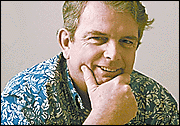


The Way I See It
I managed to catch 1972 Olympic marathon gold medalist Frank Shorter last night as he was packing his bags for the 103rd Boston Marathon. In Boston, marathon
makes for terrific TVShorter will be anchoring TV coverage of Monday's race for the 17th year in a row, and he's as fired up as he was in Munich.
You have to be if you're going to broadcast Boston. It's the only marathon in the world covered live by four TV stations and an assortment of radio stations.
The competition among the three network affiliates and a cable station is so intense that the papers are filled with stories the next day of who outdid whom.
"They're very serious about it," said Shorter, by phone from his Colorado home.
"The production at WBZ is everything the equal of the Olympic marathon. They have a network of spotters with cell phones at every mile calling in splits. And what they do in terms of reporters out at the start, along the line ... In a sense it's a bigger production in terms of manpower and cost than NBC would do for the Olympic marathon."
Familiar running experts such as Bill Rodgers (at 51 he'll run for the first time since 1990), Joan Benoit Samuelson, Toni Reavis and Marty Liquori have often manned the mikes at competing stations.
Coverage starts hours before the gun cracks with features and interviews with runners trying to keep warm in the chilly April morning air in Hopkinton. When the race begins at noon, the coverage continues for four hours.
YOU get to know the runners, you get to care about their fate on the course, and you hang on developments. It's addictive.
"We'll watch for breaks in the races, and if there are spots where we anticipate something is going to happen, we won't go to commercial break," said Shorter. "In other telecasts, where it's not perceived as critical to get it, they'll just go to commercial and show it on tape when they come back. In Boston, you don't do that . Everybody wants to be on top."
Shorter said the New York, Chicago and some other major marathons have exclusive deals with one TV affiliate.
"But the BAA (Boston Athletic Association) knows better than to try to sell exclusive coverage," he said. "It's such a big deal there that the BAA doesn't even consider doing it with one TV station, even if they could make a lot of money on it. They wouldn't dare."
Could the Honolulu Marathon ever fetch live competing TV coverage? It's unlikely, due to the race's very early start (5 a.m.) and much of it being run in darkness.
I can remember April 18, 1983, when Maine's Joan Benoit set a stunning world record for women with a 2:22:42 performance at the 87th Boston Marathon. Only a year earlier, two American men, Oregon's Alberto Salazar and Minnesota's Dick Beardsley, staged one of the closest finishes in Boston history, both clocking under 2:09:00.
That's certainly ancient history. Can you believe that no American woman has managed to run under 2:40:00 this year? And the best American male finish in 1999 is 2:19:05 by Thomas Lentz of Ohio.
The last American man to win Boston was Greg Meyer (Massachusetts) in 1983 with a time of 2:09:00, and the last American woman to win there was Lisa Larsen Weidenbach (Michigan) in 1985 with a time of 2:34:06.
The defending Boston champions, Moses Tanui (2:07:34) of Kenya, and Fatuma Roba (2:23:21) of Ethiopia, are the favorites this year.
Pat Bigold has covered sports for daily newspapers
in Hawaii and Massachusetts since 1978.